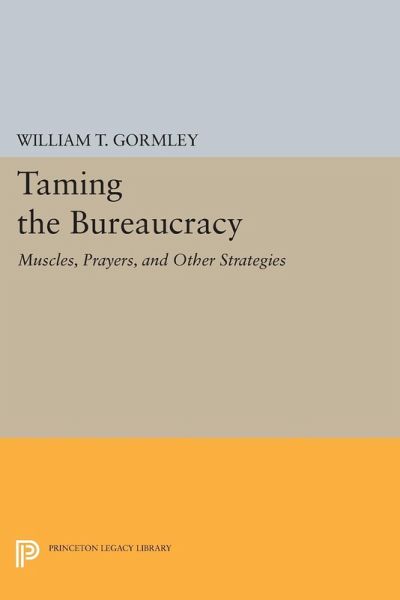
Taming the Bureaucracy (eBook, PDF)
Muscles, Prayers, and Other Strategies
Versandkostenfrei!
Sofort per Download lieferbar
34,95 €
inkl. MwSt.
Weitere Ausgaben:

PAYBACK Punkte
17 °P sammeln!
Americans are just emerging from one of the great reform eras in our historyan era in which we attempted to control public bureaucracies through interest representation, due process, management, policy analysis, federalism, and oversight. The United States has, in fact, undergone an institutional realignment and has emerged with a weaker, less autonomous bureaucracy. In a book that will interest not only public administration specialists but students of American government generally, William Gormley examines the consequences of the reform efforts of the 1970s and 1980s and seeks to understand ...
Americans are just emerging from one of the great reform eras in our historyan era in which we attempted to control public bureaucracies through interest representation, due process, management, policy analysis, federalism, and oversight. The United States has, in fact, undergone an institutional realignment and has emerged with a weaker, less autonomous bureaucracy. In a book that will interest not only public administration specialists but students of American government generally, William Gormley examines the consequences of the reform efforts of the 1970s and 1980s and seeks to understand why, despite an astonishing number of these efforts, we remain dissatisfied with the results.
"The American bureaucracy is beleaguered and besieged," writes Gormley. ". . . Unfortunately, the bureaucracy's critics are equally capable of blunders." The author explains our situation by analyzing a spectrum of controls ranging from catalytic to hortatory to coercive. Catalytic controls--such as proxy advocacy, environmental impact statements, and freedom-of-information acts--are most flexible, while coercive controls--such as legislative vetoes, executive orders, and judicial take-overs of state institutions--are most rigid. While recommending that controls be tailored both to issues and to bureaucracies, Gormley shows that coercive interventions (or muscles) often generate new bureaucratic pathologies without eradicating old ones. In contrast, catalytic controls (or prayers) energize the bureaucracy without predetermining a hastily crafted response.
Originally published in 1989.
The Princeton Legacy Library uses the latest print-on-demand technology to again make available previously out-of-print books from the distinguished backlist of Princeton University Press. These editions preserve the original texts of these important books while presenting them in durable paperback and hardcover editions. The goal of the Princeton Legacy Library is to vastly increase access to the rich scholarly heritage found in the thousands of books published by Princeton University Press since its founding in 1905.
"The American bureaucracy is beleaguered and besieged," writes Gormley. ". . . Unfortunately, the bureaucracy's critics are equally capable of blunders." The author explains our situation by analyzing a spectrum of controls ranging from catalytic to hortatory to coercive. Catalytic controls--such as proxy advocacy, environmental impact statements, and freedom-of-information acts--are most flexible, while coercive controls--such as legislative vetoes, executive orders, and judicial take-overs of state institutions--are most rigid. While recommending that controls be tailored both to issues and to bureaucracies, Gormley shows that coercive interventions (or muscles) often generate new bureaucratic pathologies without eradicating old ones. In contrast, catalytic controls (or prayers) energize the bureaucracy without predetermining a hastily crafted response.
Originally published in 1989.
The Princeton Legacy Library uses the latest print-on-demand technology to again make available previously out-of-print books from the distinguished backlist of Princeton University Press. These editions preserve the original texts of these important books while presenting them in durable paperback and hardcover editions. The goal of the Princeton Legacy Library is to vastly increase access to the rich scholarly heritage found in the thousands of books published by Princeton University Press since its founding in 1905.
Dieser Download kann aus rechtlichen Gründen nur mit Rechnungsadresse in A, D ausgeliefert werden.













